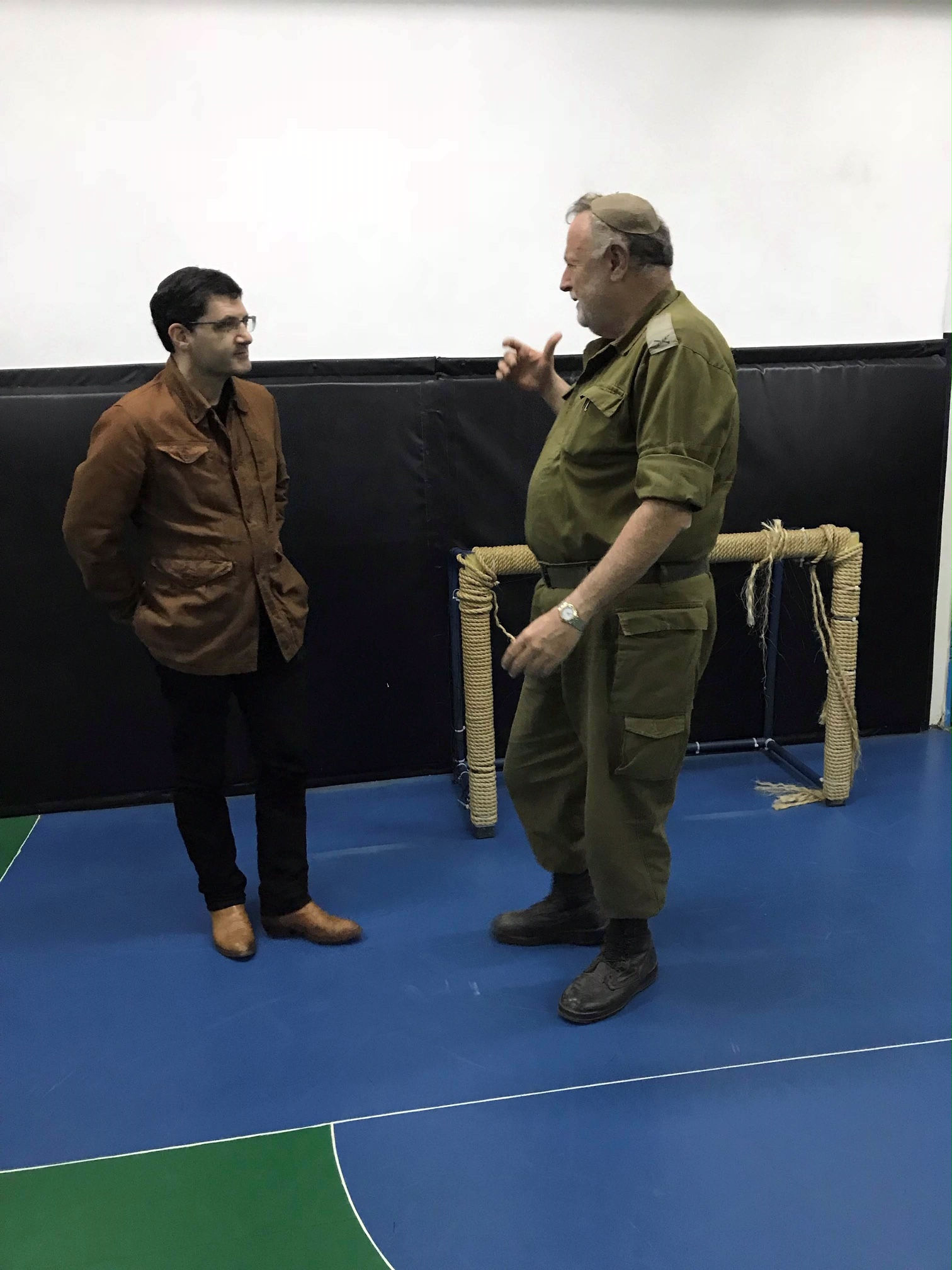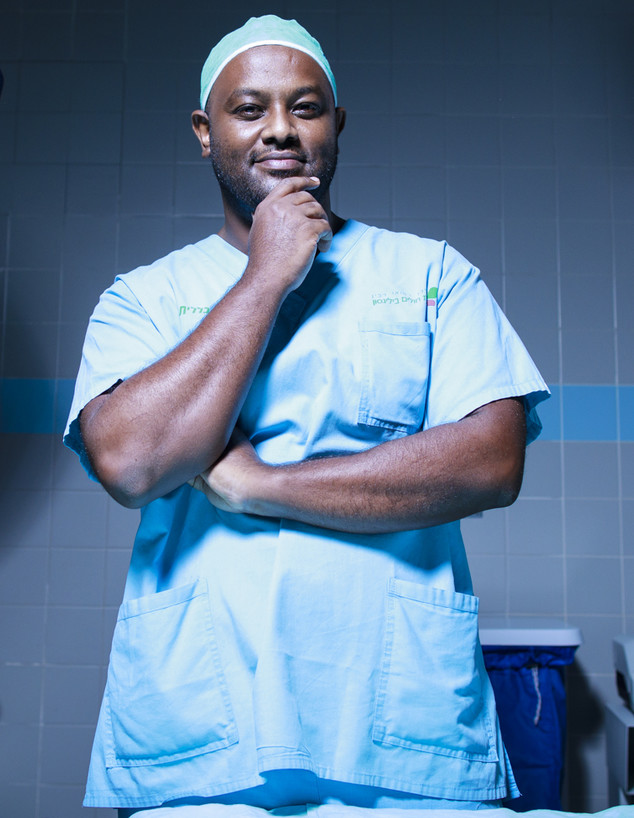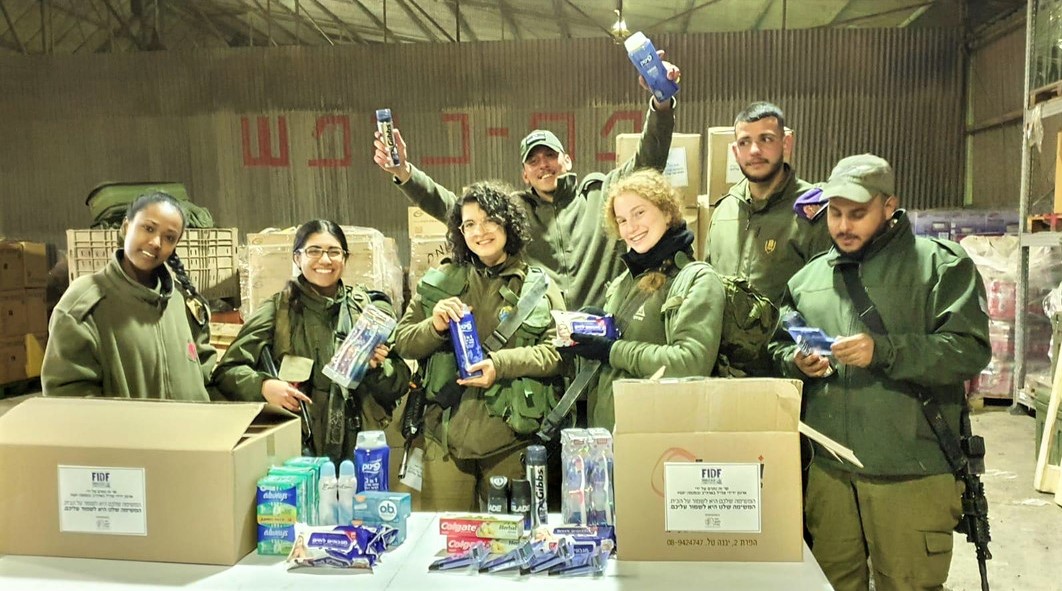From the milking shed in his father’s upstate dairy farm to the pulpit of a high-profile Beverly Hills synagogue to guiding the Orthodox Union (OU) through a period of great growth, Rabbi Steven Weil is bringing it all together for his newest challenge, leading the Friends of the Israel Defense Forces (FIDF) into the future.
As its new national director and CEO, the 55-year-old New Jersey man is picking up where Maj. Gen. (Reserve) Meir Klifi-Amir left off after six years at the helm.
The first Orthodox rabbi to do the job, Weil is taking on an organization that’s raised more than $1 billion in the nearly 40 years since a group of American Holocaust survivors got together to find a way to support Israel’s soldiers. Today, FIDF has more than 150,000 donors with 25 chapters throughout the United States and Panama, supporting IDF soldiers and veterans with everything from gyms, synagogues, sports centers, sukkahs and lounges on their bases to college scholarships, programs for disadvantaged soldiers and job training.
The offerings range from big to small. When a bunch of soldiers exhausted from weeklong maneuvers sees an ice-cream truck welcoming them back on base, “it’s one way to show them the Jewish people in the Diaspora know how hard they work and what they’re sacrificing,” says Weil. “We want them to know we appreciate it.”
Weil was raised as a proud Zionist, growing up knowing that his was one of the few branches of the family who escaped the fate of most of the other German Jews. In fact, his father and grandfather were so passionate about the Jewish people’s need for a homeland that they asked their Christian customers visiting the farm to buy Israeli bonds.
“They told them, ‘We want you to have a hand in fulfilling the prophecy you read about in Isaiah,’ ” recalls Weil.
After completing rabbinical school at Yeshiva University’s Rabbi Isaac Elchanan Theological Seminary and a master’s degree in Business Administration from New York University, Weil took pulpits first in Oak Park, Mich., and then in Beverly Hills, Calif.

In 2009, he moved back East with his family to step into the job of senior managing director of the OU. During his tenure, he expanded the organization’s reach through such programs as Israel Free Spirit Birthright, which has sent thousands to Israel as part of the larger Taglit-Birthright movement.
“There’s something so powerful in connecting Jews of all backgrounds with Israel and Israelis,” he says, adding that the highlight of these trips is the bonds of understanding that grow up between the Americans and the IDF soldiers who accompany each group.
Forging such Jewish connections across the ocean is a mission Weil carries with him into his new job. “We’re also about strengthening these bonds that can literally transform the future of Israel and the Jewish people,” he says.
Demographics show the fastest growth of the Jewish people is occurring in Israel—a trend that appears to be gaining momentum. “It’s the first instance in history when a refugee people has returned to its ancestral home and language after 2,000 years,” says Weil. “To secure its future, we’re partnering with the IDF to support each and every soldier who literally puts their lives on the line for their country and for Jews everywhere.”
‘It’s made it all possible’
If you’re one of the 118,000 active-duty soldiers the FIDF serves every year or the hundreds of thousands of reservists who give more than a month each year to their country, though you may not realize it, many of the recreational and religious facilities you walk by on base are gifts of FIDF donors.
Smaller but no less valued are the Passover seders and other holiday meals the FIDF helps sponsor for the homesick 18-year-olds who need to stay on base and miss their mother’s chicken soup. Less visible are those programs that provide help to wounded veterans and the families of fallen soldiers. Not to mention the thousands of soldiers who are regularly sent home to their low-income families with gift cards usable in any grocery store in Israel, ensuring that the whole family can enjoy Shabbat and holidays together. “They look like a debit card, not food stamps, so they keep the soldier’s and their family’s dignity,” says Weil.
One powerful way the FIDF is building a stronger Israel is by sending combat-unit veterans from low-income families to college. Since its beginnings in 2002, the Impact program has enabled more than 17,000 young Israelis to earn door-opening degrees by paying their tuition and related expenses.
One of them is Dr. Jonathan Reuven. Born in 1983 in Addis Ababa, he was a baby when he made aliyah with his mother, brother and sister. His father was left behind. A political prisoner, he still had another six months to serve on his sentence for working to free Ethiopian Jews.
Reuven had finished a pre-army leadership program when he placed into an elite IDF intelligence unit. Five years later, his service behind him, he lived his dream of entering medical school thanks to the Impact program, followed by a Ph.D., where he researched the kind of health problems Ethiopian immigrants are prone to.

Reuven has stayed close to the woman in Chicago who sponsored him all those years—“she’s part of the family,” he says. And, he says that he’s equally grateful for the requirement for each Impact recipient, as busy as they are in school, to give 130 hours a year to volunteer work; his hours were spent working with traumatized kids in a women’s shelter and delivering food to the poor and elderly. “It was a tremendous opportunity to give back and not focus only on yourself,” he says.
Now 37, married and the father of two, Reuven is in his third year of an ear, nose and throat internship, with two more to go. “Without Impact, I would not have been able to finish medical school and take this Ph.D.,” he says. “It’s made it all possible.”
Other programs FIDF partners in include Project Overcome for soldiers from dysfunctional homes who “would never make it in a regular unit,” says Weil.
These help the one-sixth of Israeli youth who are labeled “at risk,” many of whom had been declared unfit for military service, often leading to long-term unemployment or a series of dead-end jobs and a lifetime of poverty and alienation. With a supportive environment, they’re tutored for their high school equivalency exam and most eventually integrate into the regular army, bringing them into the mainstream of Israeli life. “Some even go on to become officers,” says Weil. “It’s a tremendous achievement and helps the IDF remain the great equalizer, leveling the playing field for kids who had a rough start in life.”
Other ways the FIDF “helps transcend the legacy of poverty,” adds Weil, are courses giving haredi soldiers the job skills needed to support their families and the Horizons program which, partnering with the government and other organizations, covers two-thirds of tuition bills for more than 14,000 low-income veterans.
‘The importance of being human’
There’s also a special spot in FIDF’s institutional heart for the IDF’s 7,000 lone soldiers. Half of them have left their families behind in 70 countries, often postponing college or careers to join the IDF. The other half consists of Israelis with no family in Israel able to care for them.
“These courageous young people give years of their lives for the express purpose of serving the Jewish state and the Jewish people,” says Weil. As a way of lightening their load, FIDF makes sure they have decent housing, flies them home for visits, brings their parents in for key army ceremonies and offers job training as well as the opportunity for scholarships.
FIDF supporters are also building a new “home away from home” for lone soldiers—a $15 million, six-story complex in Rishon Letzion, designed to provide housing for nearly 200.
But if you ask former lone soldier Maya Blanding what her favorite FIDF program is, she’ll tell you it’s the annual Yom Kef (“Fun Day”).
“They take thousands of us lone soldiers to a huge park with a pool and great food,” says the former New Yorker who now lives in Tel Aviv. One year she was finishing up a 10-day trek “sleeping outside and eating tuna from the can,” when her commander said, “Hurry and get dressed. You’re going on your Fun Day.”

“It’s a day to just enjoy ourselves and meet up with friends,” she says, “especially amazing after all those canned rations.”
Blanding recalls that visiting Israel as a kid, “each time I returned home I felt like I was leaving home instead,” she says. So, after earning her business administration degree from Tulane University in 2016, she headed to Israel and into an IDF uniform.
Opting for combat duty, she tested into the elite “Sky Rider” Unit of the Artillery Corps as a Drone pilot and operator, one of four women in a class of nearly 30. “I figured that way I could make a difference and give back to Israel,” she says. “It was the most intense training I could ever imagine.”
Making a difference is also the way Blanding describes the impact of FIDF on lone soldiers both on and off base—mentioning housing, the trips home and such holiday gifts as warm blankets at Hanukkah time.
A personal highlight: Being selected to share her lone soldier experience with American FIDF supporters. “It was amazing to meet so many people who love Israel and, since they don’t live here themselves, wanting to do whatever they can to make things better for Israel’s soldiers.”
Following an FIDF gala in Los Angeles, several of the soldiers joined a Holocaust survivor to speak to schoolchildren. “After he told his story, this man who’d been through so much turned and thanked us,” she says. In that moment, thousands of miles away, “I felt so proud to be a part of Israel.”
Today, two years after she took off her uniform for the last time, Blanding is now working for a Tel Aviv marketing agency and remains close with many of those she served with.
“I’ve learned what it’s like to give more of yourself when you think you have nothing left to give, and the importance of protecting our nation and our people,” she says. “And that some people judge this incredible country from a distance and believe everything the media feeds them without knowing the reality. But the most important lesson was the importance of being human before anything else—a lesson I didn’t expect to learn in the military.”
‘An important message’
In his 24 years in the IDF, Lt. Col. Eyal Dror saw firsthand FIDF’s impact on his soldiers’ lives.
On his base in the Golan Heights, with its intense summer heat and winter rains, “they really appreciate being able to work out in the new gym,” says Dror, who retired last year.
Other FIDF gifts include the synagogue and meeting hall for briefings and events, “and scholarships many of them need to succeed when they start their real lives,” he adds. “It gives them a warm feeling just knowing Jews around the world care about them. It stays with them the rest of their lives.”
Dror also sees the value in FIDF missions bringing Jews and others from America to meet the soldiers. “Many of them didn’t know that the IDF provides humanitarian aid—most recently, with COVID-19—to people of all religions and nationalities, whoever’s in need. That’s an important message that they take home and tell others.”

‘The great unifier’
With so much anti-Israel propaganda on today’s college campuses threatening to alienate young Jews, what does Weil plan to do to capture the minds and hearts of the next generation and strengthen their bonds with the Jewish homeland?
“For many American Jews, especially younger ones, the principles of social justice—equity, diversity, and gender inclusivity—are key,” he says. “But few realize that these same values are at the heart of everything the FIDF does—that Israel has the most moral army in the world, focused on the sanctity of life and protecting civilians.
“Few also see how many opportunities are provided for minorities,” he adds “The Ethiopian serving next to the Russian who’s next to the Druze … the IDF is the great unifier.”
Weil’s vision of inspiring the next generation of supporters is one reason FIDF board chair Peter Weintraub is optimistic about the future.
“As soon as we met Steve, we knew we had the perfect candidate for the job,” says Weintraub. “He’s someone with a deep track record of leadership in growth and expansion in the American Jewish nonprofit world, and able to identify the needs of tomorrow today and make sure we can raise the resources needed to meet those needs.”
‘Serve the Jewish people’
Weil is not going to be completely alone at the top. To balance the leadership with the perspective of an IDF insider, the FIDF has announced it’s bringing in the former head of the IDF Central Command, Maj. Gen. Nadav Padan.
“It should be a great team,” says Weintraub. Having the two of them with such different backgrounds but a shared vision promises to make the FIDF that much stronger.”
The FIDF’s mission has never been more needed, maintains Weintraub. “Now more than ever, the Jewish community has to see the IDF and Israel itself as a light unto the nations, to take to heart all the needs of these amazing young people—spiritual, emotional and physical. Giving each one a chance to make it in life, regardless of their background. And Steve is the one who can communicate this with sincerity.”
Indeed, communicating is one of a rabbi’s chief skills, said Weil. “A rabbi learns from the past to see into the future, to anticipate tomorrow’s needs. And the greatest blessing is being able to use that to serve the Jewish people.”
“He’s an Orthodox rabbi, and I’m a Reform one,” says Weintraub. “But Steve relates to the entire range of the Jewish experience with a deep love and an unwavering commitment to Israel and the Jewish people. He knows that the IDF is not only Israel’s army, it’s the Jewish people’s army. It’s a very good shidduch.”


























